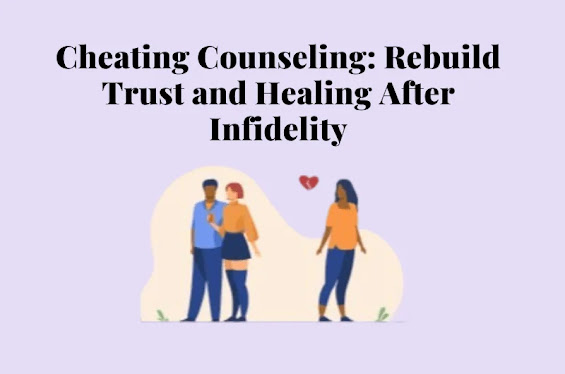What do therapists say about cheating?
Infidelity, commonly known as cheating, is a painful issue that can shake the foundations of a relationship. Many couples facing this dilemma turn to therapists for guidance and support. In this blog post, we'll explore what therapists have to say about Cheating Counseling and how relationship counseling can help navigate this complex and challenging situation.
Understanding Cheating in Relationships
Cheating in a relationship involves one partner engaging in a romantic or sexual involvement with someone outside the committed relationship. It can lead to feelings of betrayal, hurt, and a breakdown in trust, often threatening the very fabric of the relationship.
The Role of Cheating Counseling
Cheating counseling, also known as couple counseling or relationship counseling, offers a safe space for couples to address infidelity and its consequences. Therapists play a crucial role in guiding couples through the process of healing and rebuilding trust.
Insights from Therapists
1. Non-Judgmental Environment: Therapists create a non-judgmental environment where both partners can express their feelings and concerns without fear of criticism. This open communication is vital for understanding the underlying issues that led to the cheating.
2. Understanding Root Causes: Therapists help couples delve into the root causes of infidelity, which can range from communication problems to unmet emotional needs. Identifying these factors is essential for addressing the issue at its core.
3. Rebuilding Trust: Therapists guide couples through the challenging journey of rebuilding trust. They provide tools and strategies to help the injured party regain confidence in their partner's commitment.
4. Effective Communication: One of the fundamental aspects of cheating counseling is improving communication within the relationship. Therapists teach couples how to express their needs, concerns, and emotions in a healthy and constructive way.
Therapy Treatment Centers
Therapy treatment centers are dedicated facilities where individuals and couples can seek professional help for relationship issues, including cheating. These centers offer a range of therapy services, such as individual counseling, couple counseling, and group therapy, to address infidelity and its aftermath.
The Healing Process
Therapists emphasize that healing from cheating takes time, effort, and commitment from both partners. It's a process that involves acknowledging the pain and working together to rebuild the relationship or make informed decisions about its future.
Benefits of Cheating Counseling
1. Resolution and Renewal: Many couples find that cheating counseling helps them resolve their issues and renew their commitment to the relationship. It can lead to a stronger, more resilient partnership.
2. Better Understanding: Both partners gain a deeper understanding of each other's needs, fears, and desires. This understanding can lead to more empathetic and compassionate interactions.
3. Conflict Resolution Skills: Therapists equip couples with conflict resolution skills that can help them navigate future challenges more effectively.
4. Closure: In some cases, cheating counseling helps couples find closure and decide to part ways amicably, minimizing the emotional turmoil associated with a tumultuous breakup.
Conclusion
Cheating is a significant challenge in relationships, but it's not necessarily the end of the road. Therapists offer a ray of hope by guiding couples through the difficult process of addressing infidelity, rebuilding trust, and finding a way forward. Cheating counseling provides a safe and supportive environment where couples can work towards healing and making informed decisions about their future together.
In the realm of relationships, therapy treatment centers play a vital role in offering professional assistance, tools, and strategies for addressing cheating and its aftermath. Through their guidance, therapists help couples navigate the complexities of infidelity and, in some cases, emerge stronger and more committed to each other.




Comments
Post a Comment